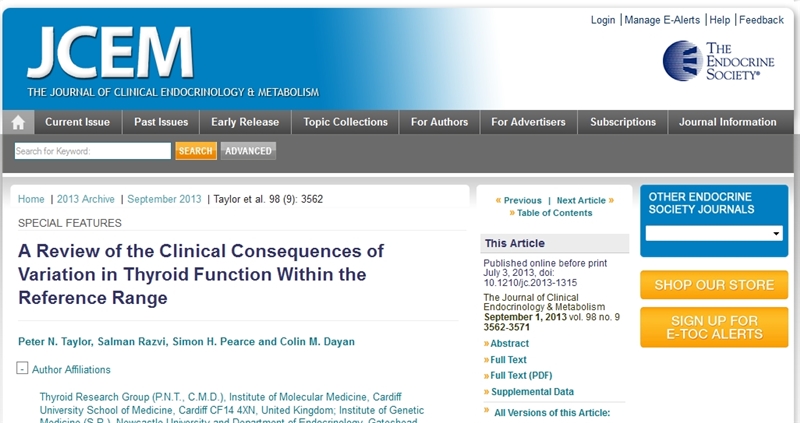Next time your doctor suggests that simply having TSH within reference range is adequate, show her/him the paper below. Even just the conclusion.
Many here have searched for and read some of the papers which went into this Review. Many here have said as much. Many here should be very pleased to see people within the profession apparently taking on board this information.
Let us hope that, rather than a simple "trickle down", this Review causes an inundation of awareness in the rest of the profession - consultants and GPs.
Of course, many here will argue that TSH doesn't work. My view is that in some people it works to an acceptable level but that it must always be considered that it might not be working in a way that allows for diagnosis and monitoring of treatment. Even in people in whom it has previously appeared to work.
Home
|2013 Archive
|September 2013
|Taylor et al. 98 (9): 3562
Special Features
A Review of the Clinical Consequences of Variation in Thyroid Function Within the Reference Range
Peter N. Taylor,
Salman Razvi,
Simon H. Pearce and
Colin M. Dayan
- Author Affiliations
Thyroid Research Group (P.N.T., C.M.D.), Institute of Molecular Medicine, Cardiff University School of Medicine, Cardiff CF14 4XN, United Kingdom; Institute of Genetic Medicine (S.R.), Newcastle University and Department of Endocrinology, Gateshead Health NHS Foundation Trust, Gateshead NE9 6SX, United Kingdom; and Institute of Genetic Medicine (S.H.P.), Newcastle University and Endocrine Unit, Royal Victoria Infirmary, Newcastle upon Tyne NE1 4LP, United Kingdom
Abstract
Context: Overt thyroid disease is associated with profound adverse health outcomes; however, data are conflicting for studies of borderline/subclinical thyroid dysfunction. Many studies of subclinical thyroid disease have had low power and were prone to selection bias. In contrast, large datasets are available from community studies in healthy individuals. Studies of the effects of variation of thyroid function across the reference range on health outcomes in these populations may provide useful information regarding thresholds for treatment of abnormal thyroid function.
Evidence Acquisition: MEDLINE and the Cochrane Database of Systematic Reviews and Controlled Trials Register were searched for articles studying the effect of variation in thyroid hormone parameters within the reference range on cardiovascular, bone, metabolic, pregnancy, neurological, and psychological outcomes.
Evidence Synthesis: Higher TSH/lower thyroid hormone levels are associated with more cardiovascular risk factors and cardiovascular events and worse metabolic parameters and pregnancy outcomes, whereas lower TSH/higher thyroid hormone levels are associated with reduced bone mineral density and increased fracture risk. The evidence base was good for cardiovascular, metabolic, bone, and pregnancy outcomes; however, high-quality data remained lacking for neurological and psychological outcomes.
Conclusions: Common variation in persons with thyroid function in the normal range are associated with adverse health outcomes. These data suggest, by extrapolation, that carefully monitored treatment of even modest elevations of TSH may have substantial health benefits. Appropriately powered large-scale clinical trials analyzing the risks vs benefits of treating subclinical thyroid disease are required to determine whether these benefits can be achieved with levothyroxine therapy.
jcem.endojournals.org/conte...
The full paper is available here:
jcem.endojournals.org/conte...
Rod

